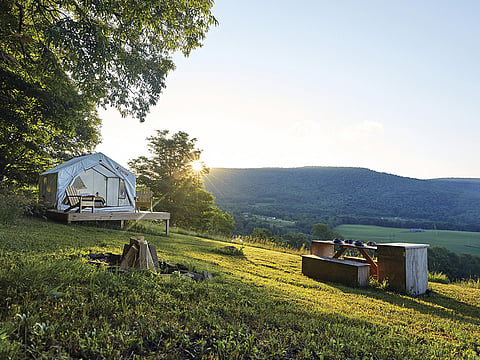On the mountaintop at Carrigeenduff
Time itself has a hard time climbing the summit where my sister lives

For several years, since my mother died, my sister and I have not been close. True, there is physical distance between us. She lives on top on a misty mountain top in southern Ireland, married to a sheep farmer, and they have five grown children.
Between running a bed and breakfast, having buses that are used to pick up local schoolchildren and ferry them to and from classes, and running a hill-walking tour business, she has a lot on her plate.
And I have lived overseas and around the world for many years, spend time between Ireland and my home in Spain, and haven’t made as much time as I should.
Besides, she knows me better and longer than anyone else — we are twins.
She had two couples of guests for two weekend nights staying over as since the pandemic restrictions were lifted, and it will be a long time again before more come that way, we both agreedMick O'Reilly
I made time to drive up and see her last week. It’s a tortuous drive — beautiful when the sun shines, treacherous when it is raining, misty or snowing. In Ireland, it is summer — at least for a couple of hours one afternoon if you missed it — so I made my way off the beaten track and headed up to her farmstead.
The road there is narrow with a fair share of walkers and hikers. To say it is a road gives the driving surface a sense of implied importance beyond its bends and width. It is a track.
Also Read: Why I hate gyms
Also Read: Masked men, and the paranoia of pandemics
Also Read: Covid-19: I have long hair again
I met Sean, Theresa’s husband, on the way down from the mountain in one of the minibuses. We both managed to find enough room so our wing mirrors did not touch, and exchanged pleasantries.
The lane to Carrigeenduff is the type of place where you can do that, turn your engines off, and have a good natter about life. Besides, there is no other road traffic, and the hill walkers might need to catch their breaths too.
At the top
At the top of the mountain, the mistress of all she surveys was in fine fettle too. The car was parked, the kettle on, and strong loose tea leaves awaited a decent scalding: Teabags have never made it up from Roundwood on country lanes and to the summit here.
Few have come this way in recent months. She had two couples of guests for two weekend nights staying over as since the pandemic restrictions were lifted, and it will be a long time again before more come that way, we both agreed.
Outside the window, bog cotton added flashes of fluffy whiteness to the deep green gorse bushes, its yellow flowers in full bloom, sheep shorn of their winter’s coats and fattening on the summer’s grass.
All the family are fine and staying safe, the relatives are mostly good too — our last remaining maternal uncle passed some months ago and she had kept the clipping of his obituary from a local newspaper. Yes, here, on top of the mountain, there are still local newspapers that carry the tidings, life and death.
The talk was easy and the old photograph albums came out — it is surprising now how many were simply out of focus and bad but serve the purpose now of recalling long gone relatives and times that have been shrouded by the mists, like the ones that sweep over the mountaintop at Carrigeenduff.
There is a wedding album that records the legitimacy of union Mum and Dad despite the abuse some might have uttered in my direction down the decades.
There are images of birthdays and baptisms, anniversaries and aspirations, cars and holidays, trains and sun loungers, family moments and momentous familiarity.
All are safe behind cellophane and cardboard vaults at the top of the mountain. Time too had difficulty reaching the top of the lane.



